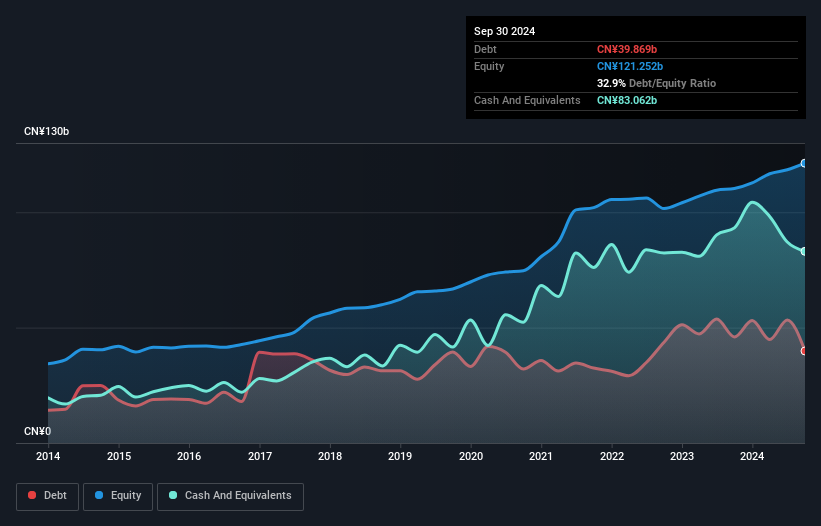David Iben put it well when he said, 'Volatility is not a risk we care about. What we care about is avoiding the permanent loss of capital.' So it might be obvious that you need to consider debt, when you think about how risky any given stock is, because too much debt can sink a company. Importantly, Weichai Power Co., Ltd. (HKG:2338) does carry debt. But the real question is whether this debt is making the company risky.
When Is Debt A Problem?
Debt and other liabilities become risky for a business when it cannot easily fulfill those obligations, either with free cash flow or by raising capital at an attractive price. In the worst case scenario, a company can go bankrupt if it cannot pay its creditors. However, a more common (but still painful) scenario is that it has to raise new equity capital at a low price, thus permanently diluting shareholders. Of course, the upside of debt is that it often represents cheap capital, especially when it replaces dilution in a company with the ability to reinvest at high rates of return. When we examine debt levels, we first consider both cash and debt levels, together.
See our latest analysis for Weichai Power
What Is Weichai Power's Debt?
As you can see below, Weichai Power had CN¥39.9b of debt at September 2024, down from CN¥45.9b a year prior. However, its balance sheet shows it holds CN¥83.1b in cash, so it actually has CN¥43.2b net cash.

A Look At Weichai Power's Liabilities
Zooming in on the latest balance sheet data, we can see that Weichai Power had liabilities of CN¥151.6b due within 12 months and liabilities of CN¥71.0b due beyond that. Offsetting these obligations, it had cash of CN¥83.1b as well as receivables valued at CN¥62.6b due within 12 months. So its liabilities total CN¥76.9b more than the combination of its cash and short-term receivables.
This deficit is considerable relative to its very significant market capitalization of CN¥111.2b, so it does suggest shareholders should keep an eye on Weichai Power's use of debt. This suggests shareholders would be heavily diluted if the company needed to shore up its balance sheet in a hurry. Despite its noteworthy liabilities, Weichai Power boasts net cash, so it's fair to say it does not have a heavy debt load!
In addition to that, we're happy to report that Weichai Power has boosted its EBIT by 54%, thus reducing the spectre of future debt repayments. The balance sheet is clearly the area to focus on when you are analysing debt. But ultimately the future profitability of the business will decide if Weichai Power can strengthen its balance sheet over time. So if you're focused on the future you can check out this free report showing analyst profit forecasts.
Finally, a business needs free cash flow to pay off debt; accounting profits just don't cut it. Weichai Power may have net cash on the balance sheet, but it is still interesting to look at how well the business converts its earnings before interest and tax (EBIT) to free cash flow, because that will influence both its need for, and its capacity to manage debt. Over the last three years, Weichai Power recorded free cash flow worth a fulsome 99% of its EBIT, which is stronger than we'd usually expect. That puts it in a very strong position to pay down debt.
Summing Up
Although Weichai Power's balance sheet isn't particularly strong, due to the total liabilities, it is clearly positive to see that it has net cash of CN¥43.2b. The cherry on top was that in converted 99% of that EBIT to free cash flow, bringing in CN¥13b. So is Weichai Power's debt a risk? It doesn't seem so to us. When analysing debt levels, the balance sheet is the obvious place to start. But ultimately, every company can contain risks that exist outside of the balance sheet. These risks can be hard to spot. Every company has them, and we've spotted 1 warning sign for Weichai Power you should know about.
At the end of the day, it's often better to focus on companies that are free from net debt. You can access our special list of such companies (all with a track record of profit growth). It's free.
Valuation is complex, but we're here to simplify it.
Discover if Weichai Power might be undervalued or overvalued with our detailed analysis, featuring fair value estimates, potential risks, dividends, insider trades, and its financial condition.
Access Free AnalysisHave feedback on this article? Concerned about the content? Get in touch with us directly. Alternatively, email editorial-team (at) simplywallst.com.
This article by Simply Wall St is general in nature. We provide commentary based on historical data and analyst forecasts only using an unbiased methodology and our articles are not intended to be financial advice. It does not constitute a recommendation to buy or sell any stock, and does not take account of your objectives, or your financial situation. We aim to bring you long-term focused analysis driven by fundamental data. Note that our analysis may not factor in the latest price-sensitive company announcements or qualitative material. Simply Wall St has no position in any stocks mentioned.
About SEHK:2338
Weichai Power
Engages in the automobile and equipment manufacturing industry in China and internationally.
Flawless balance sheet with proven track record and pays a dividend.
Similar Companies
Market Insights
Community Narratives




